 Petzlover
Petzlover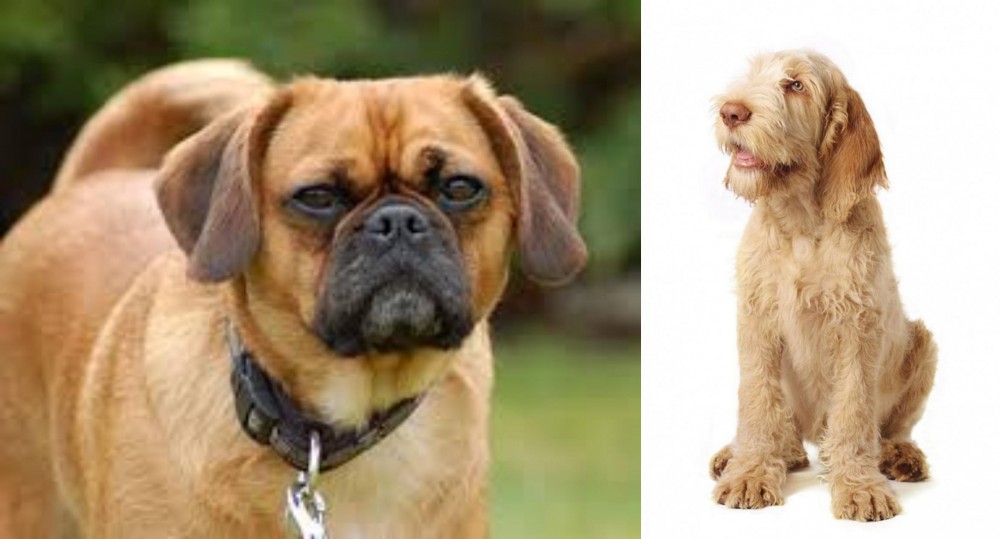 Pugalier is originated from United States but Spinone Italiano is originated from Italy. Pugalier may grow 35 cm / 13 inches shorter than Spinone Italiano. Pugalier may weigh 29 kg / 63 pounds lesser than Spinone Italiano. Pugalier may live 6 years more than Spinone Italiano. Pugalier may have less litter size than Spinone Italiano. Pugalier requires Low Maintenance. But Spinone Italiano requires Moderate Maintenance
Pugalier is originated from United States but Spinone Italiano is originated from Italy. Pugalier may grow 35 cm / 13 inches shorter than Spinone Italiano. Pugalier may weigh 29 kg / 63 pounds lesser than Spinone Italiano. Pugalier may live 6 years more than Spinone Italiano. Pugalier may have less litter size than Spinone Italiano. Pugalier requires Low Maintenance. But Spinone Italiano requires Moderate Maintenance
 The Pugalier is a designer dog which dates to the 1980s and 1990s. Being a fairly new dog breed, it doesn’t have a long or detailed history.
The Pugalier is a designer dog which dates to the 1980s and 1990s. Being a fairly new dog breed, it doesn’t have a long or detailed history.
It is thought that they were first bred in the United States. There was a purpose behind the crossing of the Pug and the Cavalier King Charles Spaniel. Dog enthusiasts were looking for a dog that would have less breathing problems with a longer nose.
There are a few dog breed registries that recognize the Pugalier as a designer dog breed, one of which is the American Canine Hybrid Club.
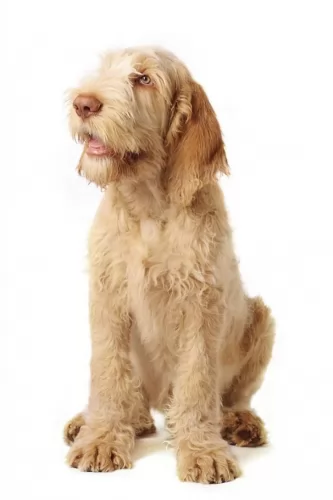 This Italian breed has an ancient blood line tracing all the back to 500 BC. Originally bred to hunt, he is today a friendly, alert and loyal companion. He is intelligent enough to do any job you give him. The Spinone is thought to be one of the oldest gun dogs ever, but it is not entirely clear that he came from Italy. There are some who think he may have come from somewhere in these European countries – Italy, Greece, France, Celtic Ireland, Spain or Russia. However, most believe the breed came from Italy in the Piedmont area.
This Italian breed has an ancient blood line tracing all the back to 500 BC. Originally bred to hunt, he is today a friendly, alert and loyal companion. He is intelligent enough to do any job you give him. The Spinone is thought to be one of the oldest gun dogs ever, but it is not entirely clear that he came from Italy. There are some who think he may have come from somewhere in these European countries – Italy, Greece, France, Celtic Ireland, Spain or Russia. However, most believe the breed came from Italy in the Piedmont area.
The most common thinking is that he is a descendent of the Spanish Pointer and/or the Russian Setter. One other theory is that setters from Greece were brought to the Roman Empire and crossed with a variety of Italian dog to make the coarse haired Spinone we see today. Then the French put in their claim that the breed is a cross of many French pointers.
The theory that counts might just belong to the Italians who believe the ancestor to the Spinone includes the German Wirehaired Pointer, the Pudelpointer and the Wirehaired Pointer. It was not until the 19th century that the name Spinone was officially given to the breed.
Before that it might have been known as a Spinoso and named after a thorn bus in Italy called the Spino. This bush was so thick and sharp that small prey animals learned to hide under it because the predators could not get through it. The Spinone however was able to fight through the briars with its thick, coarse hair and tough skin.
The breed almost became extinct during the second world war as before and after the hunters in Italy had started to use other breeds for hunting. Breeders also began to cross the Spinone with wire hairs like German Wirehaired Pointer, the Wirehaired Pointing Griffon and the Boulet.
The most popular hunting dog in Italy today is the Bracco Italiano while the Spinone is still used for hunting.
 The Pugalier looks fairly similar to a pug but with a slightly longer nose and longer ears. The tail isn’t as coifed as with the Pug, but is longer and straighter, sometimes curling slightly over the back.
The Pugalier looks fairly similar to a pug but with a slightly longer nose and longer ears. The tail isn’t as coifed as with the Pug, but is longer and straighter, sometimes curling slightly over the back.
As with any crossbreed, the dog’s appearance can vary between the two dogs. They can be small to medium sized, usually standing at between 30 and 35cm in height and weigh between 6-10kg.
Pugaliers mostly have a fairly short coat but there are some which have longer hair because of the Cavalier's influence. The coat can be an apricot color, white, brown or even tri-color - white, black & tan.
Friendly, social ad loving, the Pugalier makes a splendid pet. He will easily adapt to life in the city or the countryside and he also gets along well with children and other dogs. They can also be amusing and entertaining, while being intelligent too.
You’ll find your Pugalier easy to train as he is intelligent and then he becomes a splendid pet with training and socialization, being obedient and well mannered wherever he is.
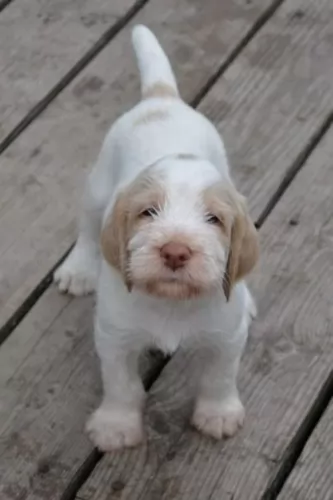 The breed is made up of strong, solid and muscled dogs that have an almost square build. His legs are made to travel any terrain and his head is long with an occipital that is pronounced and unique to the Spinone. They are said to have “human appearing eyes”, with a docked tail in countries allowing it and webbed paws.
The breed is made up of strong, solid and muscled dogs that have an almost square build. His legs are made to travel any terrain and his head is long with an occipital that is pronounced and unique to the Spinone. They are said to have “human appearing eyes”, with a docked tail in countries allowing it and webbed paws.
Shorter hair covers their feet, head, legs, muzzle and ears. They have longer hair on their eyebrows and it is stiff, with soft hair on the muzzle and cheeks with a beard and mustache. It is a single coated dog though the coat is rough. They should have skin, lips, nose, and pads in colors that coordinate with their coats. For white dog it is a red-orange color, brown in dogs that are roan colored and dark red-orange in the orange and white colored dog.
 The Pugalier gets his characteristics from both the popular parent breeds he comes from – the Pug and the Cavalier King Charles Spaniel.
The Pugalier gets his characteristics from both the popular parent breeds he comes from – the Pug and the Cavalier King Charles Spaniel.
Both these dog breeds are immensely popular, friendly, loving and amusingly entertaining. He is an excellent dog choice for the first time dog owner.
The Pugalier is an intelligent dog breed and easy to train too. When you bring such a sweet dog into your home, you open the doors to a deep, meaningful friendship and loyalty from your canine pet.
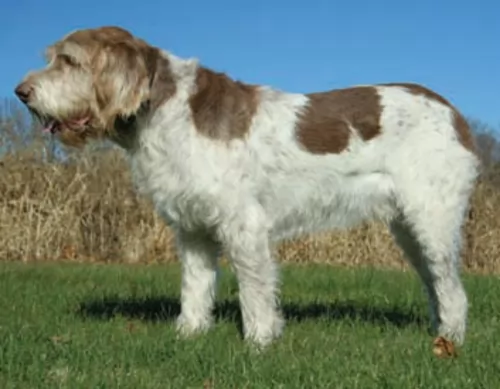 3.Adaptability – Young dogs need a lot of attention but they don’t need a lot of space. The young dogs are energetic while the adult dogs are laid-back. They need exercise every day and at least a small back yard.
3.Adaptability – Young dogs need a lot of attention but they don’t need a lot of space. The young dogs are energetic while the adult dogs are laid-back. They need exercise every day and at least a small back yard.
 Less wrinkles and a longer snout make the Pugalier a healthier dog than the purebred Pug. The dog, when well cared for, can still reach a good age of 14 or so years.
Less wrinkles and a longer snout make the Pugalier a healthier dog than the purebred Pug. The dog, when well cared for, can still reach a good age of 14 or so years.
Eye problems can still be a problem as both the Pug and the Cavalier have protruding eyes.
Patellar Luxation is another health issue to watch for. The patella or the kneecap is dislocated and the dog will have difficulty with putting weight on the leg. Your vet may perform surgery on your dog and the prognosis is very good if arthritis hasn’t already developed.
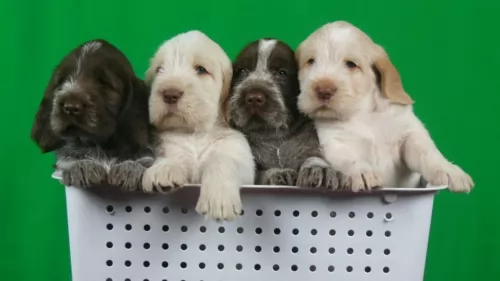 This is an ancient breed with not a lot of documented genetic issues, but it does have one deadly condition.
This is an ancient breed with not a lot of documented genetic issues, but it does have one deadly condition.
• Cerebellar ataxia (CA) is inherited and hits the puppies. Because it is a recessive gene both the mother and father must carry it for the puppy to inherit it. This makes it less likely than it would be otherwise. Puppies with the condition do not live more than a year. Since it is a genetic problem there is now a test for it that identifies carriers at a 95% accuracy rate.
• Like many other large breed dogs, they are susceptible to hip dysplasia. This can cause arthritis and/or lameness. There are now hip replacement surgeries available for this condition.
• Bloat is again common in large dogs and you need to watch for it with the Spinone. It can be deadly if not treated immediately. Let your dog rest quietly after eating. Do not let her exercise or play energetically after eating.
 Your Pugalier will require daily exercise, and he will just love a walk. The Pug part of him will tell you to go slowly with exercise and to ensure it isn’t too strenuous.
Your Pugalier will require daily exercise, and he will just love a walk. The Pug part of him will tell you to go slowly with exercise and to ensure it isn’t too strenuous.
The Spaniel part of him will love a robust ball game or running backwards and forwards between two people throwing a frisbee. Watch the Pugalier during exercise and don’t allow him to get overly hot and bothered.
Pugaliers do shed hair and you will need to brush him twice a week. Check his eyes and inside his ears and make sure all is as it should be.
Trim his nails and look inside his mouth for bad teeth. Dog’s can’t tell you they’re in pain and bad teeth can cause terrible pain and a lot of health issues throughout the entire body.
Every dog needs an excellent diet if he is to ward off illness and live a long life.
There are some excellent commercially manufactured dog foods on the market so read the packaging carefully and avoid those ones with low quality ingredients like colorants, lots of preservatives and fillers.
High quality dry kibble can be made more inviting when you add in some home-cooked food twice a week. Boiled chicken, sweet potatoes, brown rice or pasta, carrots and spinach will be excellent for him – it is simple and nutritious.
Chop the food up finely and add it into the dry kibble. Also, your little pet will thrive on some raw meat occasionally too as this keeps the coat shiny and and the skin free of infections. Make sure he is never without a constant supply of fresh, cool water.
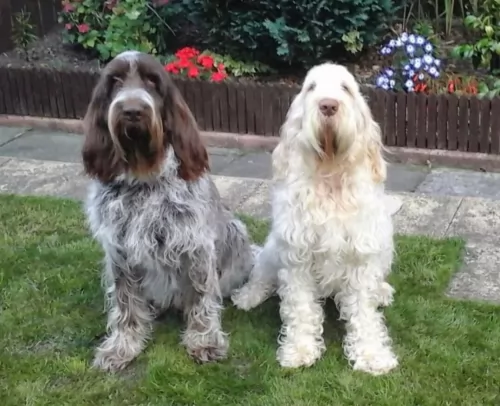 1Feeding the puppy – feed a high quality dog food for puppies of large breeds. Feed 3-4x day but don’t overfeed or let him exercise after eating even as a puppy.
1Feeding the puppy – feed a high quality dog food for puppies of large breeds. Feed 3-4x day but don’t overfeed or let him exercise after eating even as a puppy.
2.Feeding the adult - feed a high quality dog food for large breeds. Feed 1-2X day but don’t overfeed or let him exercise after eating.
4. Games and Exercises – The Spinone is an active breed, but not a fast dog. In fact, they like to travel at a trot so it becomes a great dog for jogging or running with. They love to jump, track, hunt, hike. They do well with agility, retrieving, flyball, carting, being a therapy dog, a rescue dog and a watchdog.